CATEGORY: INNOVATION
Protecting yourself and your loved ones from heat exhaustion or heat stroke is more important than ever. However, it’s not always that easy to tell when someone is overheating. Here’s how to identify.

Protecting yourself and your loved ones from heat exhaustion or heat stroke is more important than ever. However, it’s not always that easy to tell when someone is overheating. Here’s how to identify symptoms of heat exhaustion or heat stroke in
Dehydration: Keeping hydrated is the most important thing you can do during a heatwave. Signs of dehydration include a dry mouth, fatigue or tiredness, sunken eyes, decreased urination, dark-coloured urination, muscle cramping, dizziness, and feeling lightheaded.
The simplest way to tell if one of your loved ones might be overheating is if they are sweating heavily. In warmer temperatures, it’s easy for anyone to begin to sweat, which can quickly lead to discomfort. While more obvious to identify and likely common across all age groups, don’t take this sign lightly.
Sometimes the heat can lead to immense feelings of discomfort, including nausea and vomiting. The most significant risk that comes with vomiting due to heat discomfort is the risk of further dehydration. A heat rash can appear as a bunch of red bumps or an irritated area of the skin, causing tiny blisters. You can prevent heat rash by wearing fewer layers, loose-fitting clothing, and staying in a cool area. If your loved one is in a care centre, ensure they have enough appropriate hot-weather clothing.
Sudden dizziness, is another important identifier in overheating amongst seniors. If you notice a loved one experiencing dizziness, make sure to get them to rest in a cool place with their legs up and drinking lots of fluids. If you notice them becoming increasingly confused, in whatever manner, seek medical help immediately.
Rapid breathing and heartbeat are common signs of heat tetany. Symptoms include hyperventilation, respiratory problems, numb or tingling feelings, or experiencing muscle spasms.
Living in extreme heat may be a high-stress environment for some seniors. The best thing to do is to remove them or yourself from the warm area and into a cool spot, wherever possible, and practice slow breathing exercises to calm down.
Chateau Glengarry offers relaxed, safe, AFFORDABLE and comfortable retirement living and respite care in a beautiful setting in Eastern Ontario. For more information or to book a tour, call Diane at 613-525-4440 or email: [email protected]; [email protected].
105 St. Paul Street, Alexandria ON
https://www.chateauglengarry.ca
Live life to the fullest at Chateau Glengarry
---------
Symptômes de surchauffe chez les personnes âgées
Il est plus important que jamais de se protéger et de protéger ses proches contre l'épuisement par la chaleur ou les coups de chaleur. Cependant, il n'est pas toujours facile de savoir si quelqu'un a trop chaud. Voici comment identifier les symptômes de l'épuisement par la chaleur ou du coup de chaleur chez les personnes âgées.
Déshydratation : S'hydrater est la chose la plus importante à faire pendant une vague de chaleur. Les signes de déshydratation sont les suivants : bouche sèche, fatigue, yeux enfoncés, diminution de la miction, miction de couleur foncée, crampes musculaires, étourdissements et sensation de tête légère.
Le moyen le plus simple de savoir si l'un de vos proches souffre de surchauffe est de constater qu'il transpire beaucoup. Lorsque les températures sont élevées, il est facile pour n'importe qui de commencer à transpirer, ce qui peut rapidement entraîner un malaise. Bien que ce signe soit plus évident à identifier et probablement commun à toutes les tranches d'âge, ne le prenez pas à la légère.
Parfois, la chaleur peut entraîner d'immenses sensations de malaise, y compris des nausées et des vomissements. Le risque le plus important lié aux vomissements provoqués par la chaleur est celui d'une déshydratation accrue. Une éruption cutanée due à la chaleur peut prendre la forme d'une série de bosses rouges ou d'une zone irritée de la peau, provoquant de minuscules cloques. Vous pouvez prévenir les éruptions cutanées en portant moins de couches de vêtements, des vêtements amples et en restant dans un endroit frais. Si votre proche se trouve dans un centre de soins, veillez à ce qu'il ait suffisamment de vêtements appropriés pour la saison chaude.
Les vertiges soudains sont un autre signe important de surchauffe chez les personnes âgées. Si vous remarquez qu'un de vos proches a des vertiges, veillez à ce qu'il se repose dans un endroit frais, les jambes surélevées, et qu'il boive beaucoup de liquides. Si vous remarquez qu'il devient de
Au Chateau Glengarry Home Living Centre, nous respectons les mesures de santé recommandées par le Gouvernement et offrons une retraite facile, sécuritaire et confortable et des soins temporaires dans un bel environnement de l'est de l'Ontario. Pour obtenir de plus amples renseignements ou pour réserver un voyage, composez le 613-525-4440 ou envoyez un courriel à: [email protected]; [email protected].




